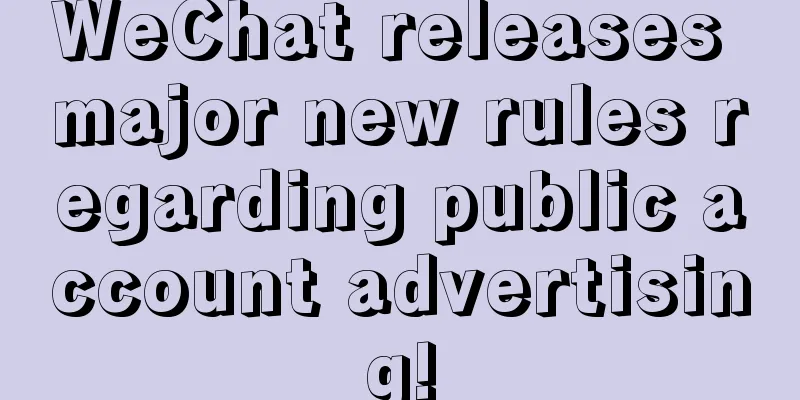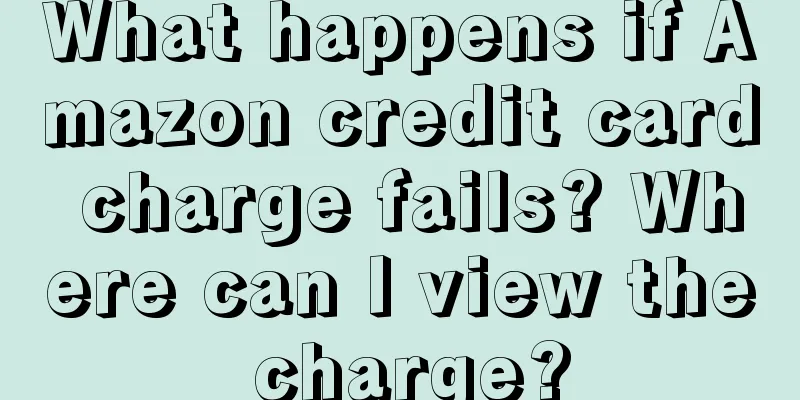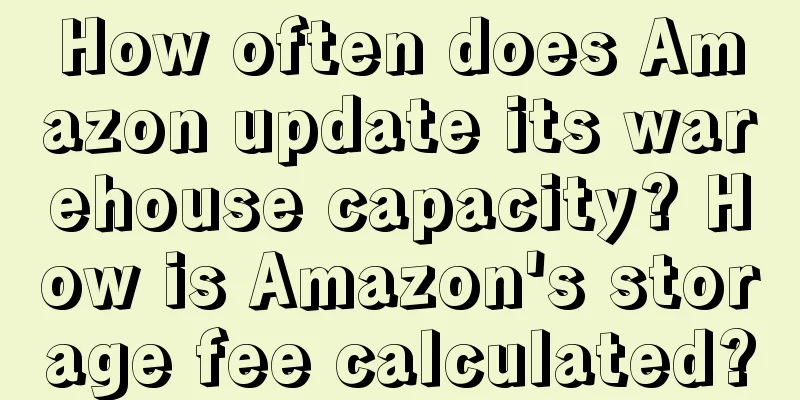WeChat releases major new rules regarding public account advertising!

The night before last, WeChat suddenly released major new regulations. An "Announcement on Further Standardizing Marketing Content on WeChat Public Platform" was widely circulated among account owners. It stipulated that some advertisements should be released through Tencent's official advertising platform after June 30, 2023. Shortly thereafter, the official account "Tencent Advertising Mutual Selection Platform Assistant" released the "Announcement on the Adjustment of Platform Service Fee Rules for Official Account Mutual Selection Advertising", stating that from June 1, 2023, the official account mutual selection advertising will reduce the platform service fee rate to 5% of the cooperation amount, and will launch a limited-time reduction and exemption activity from June 1 to June 30, 2023. For a while, there were many different opinions. So, what exactly is this new rule about? 1. What do the new regulations on public account advertising say?First, let me share with you the definitions of the concepts mentioned in the two new regulations: 1. Public account mutual selection advertisingIt refers to a transaction model in which advertisers and traffic owners choose each other and freely reach content cooperation. Advertising creativity is presented in the content of public account articles. Advertisers need to complete account recharge before placing an order, and the deduction includes a 5% service fee; public accounts with more than 500 fans and no violations such as brushing fans can become traffic owners, and the price set for advertising is pre-tax income. 2. Commission-rebate product advertisementsIt is an Internet advertising monetization service that pays according to transactions, that is, appropriate rebate products are embedded in the official account articles, and the traffic owner can obtain the corresponding sales share after the actual transaction. The entry threshold of traffic owners is the same as that of mutual selection advertising. The actual income before tax of each order = the actual payment amount of the user x the commission rate of 90%. WeChat charges 10% of the settlement commission of the traffic owner from each order as a service fee. To put it simply, whether it is content cooperation or product sales, both placement and ordering can be completed on the official advertising platform. Correspondingly, the platform will charge a certain service fee. Both of these forms of advertising are within the scope of the new regulations, and they are related to the jobs of public account owners. On May 24, the WeChat team published an article entitled "Announcement on Further Standardizing Marketing Content on WeChat Public Platform" (hereinafter referred to as the "Announcement"), which sparked heated discussions among public account owners. Jam Girl summarized several points emphasized in this announcement: 1. The advertising content targeted by the announcement refers to the commercial cooperation marketing content between the public account operator and a third party to promote goods or services, such as additional shopping links and other purchasing methods. The key point is that the advertising form of third-party entities and attached shopping links are the prerequisites of the regulations. In other words, the new regulations do not target all public account advertisements. If it is a mini program mall with the same entity as the public account, or the advertising content does not have shopping links, it is not within the scope of this new regulation. For cooperation involving third parties, it is necessary to focus on whether the subject is consistent. For example, if the shopping link is redirected in the form of QR code or reading the original text, but the subject of the shopping link is different from the official account; if the third-party mini-programs such as Youzan Mall and Kuaituan Tuan are used in different subjects, they all need to follow the new regulations and go through the channels of the official advertising platform. 2. After June 30, 2023, the specified advertising content should be released through Tencent's official advertising platform, otherwise the relevant content and accounts will be restricted. According to the "Announcement on the Adjustment of Platform Service Fees for Public Account Mutual Selection Advertisements", the platform service fee rate will begin to be lowered from June 1, and the service fee exemption period will be from June 1 to June 30. After June 30, the new regulations will be officially implemented, and the service fee rate will be restored to the lowered 5%. It can be said that June is the adaptation period given by WeChat, allowing everyone to experience it for free and become familiar with the process of advertising on the official platform. 3. If there are relevant commercial cooperation needs, operators and brands must enter Tencent's official advertising platform and become traffic owners or advertisers before June 30, 2023. Under this premise, if the advertising article contains brands or products of different entities and links, such as a collection of e-commerce products from different suppliers, the third-party brands and suppliers to which the links jump need to enter the official advertising platform in advance to ensure that the account owner can receive orders and settle accounts on the platform as a traffic owner. Earlier, WeChat public accounts already supported inserting multiple different advertisements in the same article through the platform. The new regulations emphasize the necessity of third-party brands and suppliers becoming advertisers to ensure the standardization of the advertising order path. Therefore, for advertisements that may have the risk of violating regulations, such as academic qualifications and health products, how to implement the new regulations depends on whether the supplier can successfully become an advertiser. As for whether the knowledge-based paid mini-programs such as Knowledge Planet that everyone is keen on during this period are within the new regulations, Jam Girl consulted the official and received a reply: Strictly speaking, this also constitutes advertising. Please pay attention to subsequent announcements for specific management methods. 2. What is WeChat’s intention?Although this announcement caused an uproar in the industry, it was actually not without warning. As early as April 25, the WeChat team issued the "Notice on Compliance and Standardization of Marketing Content in WeChat Official Accounts", which stipulates that if goods or services are promoted through various forms and shopping links or other purchasing methods are attached, the word "advertisement" should be prominently marked. This announcement has deepened its scope. Obviously, the regulations released last month were in response to the "Internet Advertising Management Measures" issued by the State Administration for Market Regulation and implemented on May 1, in order to implement the advertising supervision rules in areas such as "soft-text advertising" and Internet advertisements containing links. This month's announcement goes a step further, by bringing together all advertising-related parties on the official platform to make the advertising cooperation process transparent, clarifying the responsibilities of advertisers, Internet advertising operators and publishers, and Internet information service providers in accordance with the "Internet Advertising Management Measures" to promote standardized management of WeChat advertising. In addition to WeChat's need to control risks on its own platform, it is also taking advantage of the "tailwind" of this supervision to "set rules" for WeChat advertising. Currently, each company has its own advertising order platform, including Douyin's Star Map, Xiaohongshu's Dandelion, and Bilibili's Fireworks, and they have all introduced regulations requiring advertising cooperation to go through official channels. In contrast, although WeChat has also established a mutual selection advertising platform, it has never made mandatory requirements for the advertising ecosystem. Therefore, public account advertising is still mainly based on relatively free transaction forms such as dispatching orders or signing agreements with advertisers. There are laws and regulations to rely on, the need to deal with the chaos in advertising, and it can also help generate revenue. Now is the time for WeChat to take advantage of the situation to rectify the advertising ecosystem. So, what impact does this new regulation have on us practitioners? For account owners, the impact is more reflected on small and medium-sized accounts. To a certain extent, it will increase the exposure opportunities of being seen by advertisers. At the same time, it also means that the types of advertisements that can be received will be reduced, because advertisements with risks of violating regulations may not necessarily pass the review and be placed on the mutual selection platform. For advertisers, the impact of the new regulations is relatively large. On the one hand, it is a good thing and can better protect the interests of both parties; on the other hand, the prerequisite for subsequently jumping to their own links is to join the mutual selection platform, which means they must bear higher delivery costs, such as service fees. For some media and platforms, the new regulations will reduce the information gap between advertisers and traffic owners, and the media that rely on this may be impacted. After all, everything is concentrated on one platform, and WeChat has become the largest "middleman", and the resource value of the media will be greatly reduced. It can be said that once this announcement was made, all parties involved in commercialization were involved in a dramatic change. As practitioners, all we can do is go with the flow, because this is a storm that may be late but is bound to come. Author: Chen Chumu Source: WeChat public account "Weiguojiang (ID: wjam123456)" |
<<: Integrated brand communication: How to do communication and how to write annual report?
>>: Marketing budget is too small? Try this method
Recommend
Which is better, Amazon advertising budget or bidding? How to calculate?
When many people do advertising on Amazon, they ne...
What changes has JD Takeout brought about after two weeks of launch?
JD Takeaway was officially launched on February 11...
Xiaohongshu hunts for local life
When online traffic growth faces saturation, the o...
Amazon Europe will launch a spring promotion in March
Amazon's nine European sites (UK, Germany, Fra...
From 0 to 100 stores, how did Zuoting Youyuan use its private domain to attract 6 million members and dominate the Chaoniu hotpot market?
In the Internet era, all industries are accelerati...
Can cross-border e-commerce companies build their own shopping malls? How?
With the progress of global economic integration, ...
What else can the nine Chinese New Year TVCs talk about besides reunion?
One of the difficulties for brands to launch TVCs ...
There's another wave of Children's Day? Adults fight with children for toys at KFC
Through the hot sales and consumer response of the...
"New Chinese Products" Overseas Gold Rush: Each Shows Its Skills
New consumption has been going global, and success...
Hurt by the 9.9 yuan set meal, catering people begin to oppose price war
In the highly competitive catering industry, price...
How do new Amazon sellers fill in sku? What is the difference between Amazon asin and sku?
Amazon has attracted many sellers to join in order...
Traffic + subsidies + global coverage: why does Douyin e-commerce attach so much importance to "key promotion products"
This year, consumers' demands have begun to ch...
With a store of 10,000 fans having monthly sales of tens of millions, how should merchants operate e-commerce on Xiaohongshu?
As a new player in live streaming e-commerce that ...
Mother’s Day Case Study | How to stand out through marketing?
Editor's note: Every Mother's Day, the Mom...
10,000-word analysis | How to achieve global conversion through people-oriented marketing on Xiaohongshu
How can brands conduct people-oriented marketing o...









